While China’s men’s soccer team has not generated much excitement in recent years, humanoid robot teams have won over fans in Beijing based more on the artificial intelligence (AI) technology involved than any athletic prowess shown.
Four teams of humanoid robots faced off in fully autonomous 3-on-3 soccer matches powered entirely by AI on Saturday night in China’s capital in what was touted as a first in China and a preview for the upcoming World Humanoid Robot Games, set to take place in Beijing.
According to the organizers, a key aspect of the match was that all the participating robots operated fully autonomously using AI-driven strategies, without any human intervention or supervision.
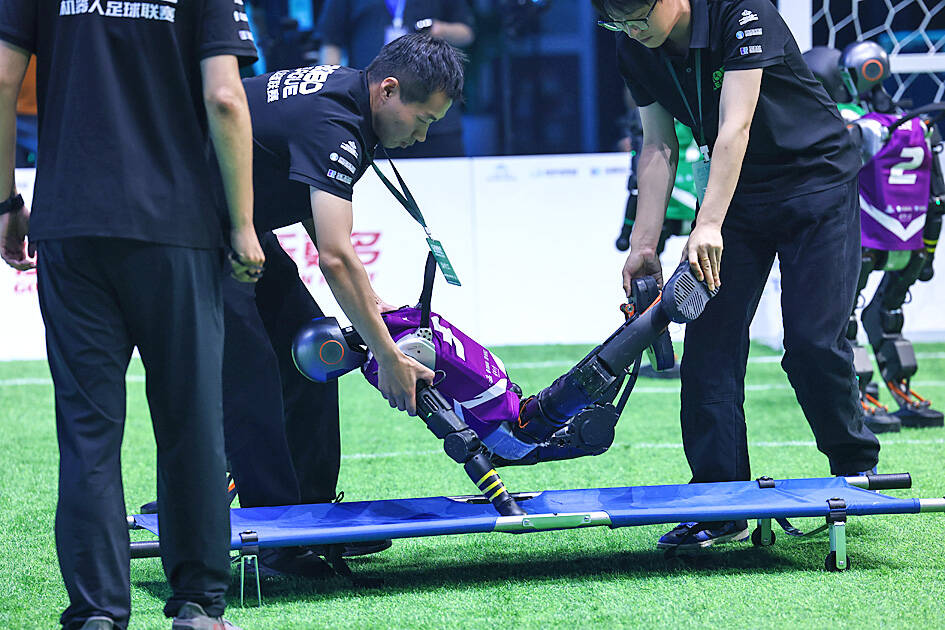
Photo: EPA
Equipped with advanced visual sensors, the robots were able to identify the ball and navigate the field with agility
They were also designed to stand up on their own after falling. However, during the match several still had to be carried off the field on stretchers by staff, adding to the realism of the experience.
China is stepping up efforts to develop AI-powered humanoid robots, using sports competitions such as marathons, boxing, and football as a real-world proving ground.
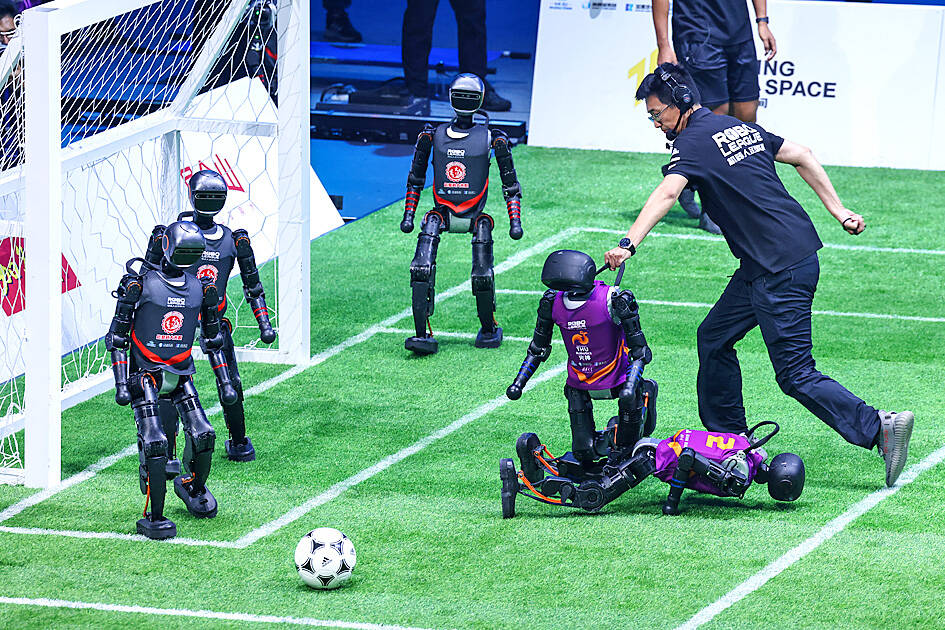
Photo: EPA
Cheng Hao, founder and CEO of Booster Robotics, the company that supplied the robot players, said sports competitions offer the ideal testing ground for humanoid robots, helping to accelerate the development of both algorithms and integrated hardware-software systems.
He also emphasized safety as a core concern in the application of humanoid robots.
“In the future, we may arrange for robots to play football with humans. That means we must ensure the robots are completely safe,” Cheng said. “For example, a robot and a human could play a match where winning doesn’t matter, but real offensive and defensive interactions take place. That would help audiences build trust and understand that robots are safe.”
Booster Robotics provided the hardware for all four university teams, while each school’s research team developed and embedded their own algorithms for perception, decisionmaking, player formations, and passing strategies — including variables such as speed, force and direction, according to Cheng.
In the final match, Tsinghua University’s THU Robotics defeated the China Agricultural University’s Mountain Sea team with a score of 5-3 to win the championship.
Mr Wu, a supporter of Tsinghua, celebrated their victory while also praising the competition.
“They [THU] did really well,” he said. “But the Mountain Sea team [of Agricultural University] was also impressive. They brought a lot of surprises.”
China’s men have made only one World Cup appearance and have already been knocked out of next year’s competition in Canada, Mexico and the US.

The Rakuten Monkeys on Sunday downed the CTBC Brothers 2-1, handing the hosts their second consecutive loss in the best-of-seven CPBL Taiwan Series at the Taipei Dome. Monkeys’ ace starter Pedro Fernandez of the Dominican Republic dominated on the mound, cruising through six scoreless innings before giving up a run on a wild pitch in the bottom of the seventh inning. He gave up only three hits and walked two batters in a 93-pitch outing, giving his Taoyuan-based team an edge. Offensively, the Monkeys’ leadoff batter Lin Li hit Brothers starter Brandon Leibrandt’s pitch over the center-field wall in the game’s first at-bat,
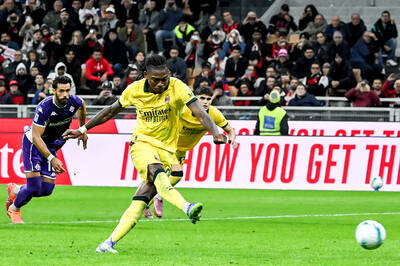
Rafael Leao on Sunday shot AC Milan to the top of Serie A with a brace in a 2-1 win over ACF Fiorentina who were enraged by the “scandalous” awarding of the penalty that decided the game. Portugal winger Leao pushed Milan one point ahead of local rivals Inter, SSC Napoli and AS Roma with a coolly taken spot-kick, given for what looked like a soft foul on Santiago Gimenez by Fabiano Parisi, with four minutes remaining. That goal capped a fine first league start of the season for Leao and came after he drew the hosts level with a brilliantly struck
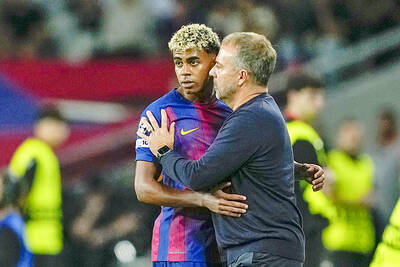
Barcelona star Lamine Yamal would be motivated by criticism ahead of the Clasico, Barcelona assistant coach Marcus Sorg said yesterday. Teenage winger Yamal has been in the spotlight in the Spanish capital after joking that Real Madrid “steal” and “complain” during an appearance on a social media stream. Champions Barca face Real Madrid today in La Liga at the Santiago Bernabeu, looking for a fifth consecutive win over their rivals. “Lamine is a top player and I think [the criticism] will be motivating for him,” Sorg told a news conference. “I hope we all see him tomorrow [give] the best performance.” The 18-year-old Spain
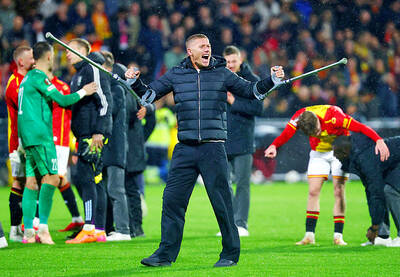
Sean Dyche on Thursday achieved in his first game with Nottingham Forest what predecessor Ange Postecoglou could not in eight matches in charge: Win. Under its new coach, Nottingham Forest presented a concentrated display resulting in a 2-0 victory over Porto in the UEFA Europa League. It was the first victory for Nottingham in the competition and only the second overall this season, while Porto were defeated for the first time this season. Morgan Gibbs-White converted from the penalty spot in the 19th minute at the City Ground in West Bridgford, England. Igor Jesus doubled the advantage from another penalty in the 77th